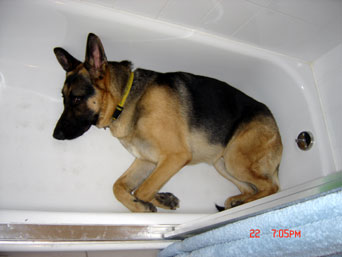German Shepherd cataracts
German Shepherd cataracts? Did you know that a German shepherd can get them? It's true, they can have them too.
First of all, just what are cataracts?
A cataract is basically any kind of opacity or loss of transparency that occurs on the lens of the dogs eye.
In some cases, this opacity might just affect the whole structure of the lens but in other cases it may be confined to just a small area on the lens.
Any time a creature has a complete cataract covering both eyes they will be blind,but if they only have small non-progressive cataracts, then these might not interfere with their vision.

It is important to know that primary cataracts do frequently occur in some breeds more than in others. Sometimes cataracts may actually develop as the result of another inherited disorder such as glaucoma or progressive retinal atrophy.
In some cases German Shepherd cataracts may actually affect one or both eyes. If a dog happens to have a small cataract in one eye it may not affect your dog's vision very much. However, at the other end of the spectrum, if cataracts begin to progress rapidly they may even cause complete blindness in your German Shepherd.
It is important to note that most German Shepherd cataracts are inherited. There can also be non-hereditary reasons for cataracts such as various diseases, toxicity, trauma or metabolic disturbances. Inherited cataracts, such as congenital cataracts, are those that are present when the puppies eyes open or before the pup is at least 8 weeks of age. Juvenile or developmental cataracts occur later on in young animals, sometimes up to about the age of 4 years while onset cataracts are said to develop in mature adult animals.
Dogs have such acute senses of smell and of hearing too, that they can easily compensate for any visual difficulties they may have - especially whenever they are in familiar surroundings. In fact, because of these talents, many dog owners may be completely unaware that their dog has any problem or any kind of vision loss in the first place.
If your dog does have cataracts or any kind of vision problems you can help by developing regular routines for exercise, keeping your visually impaired dog's surroundings the same, or if you must, introducing any kinds of changes very gradually over time, and being as patient as possible with your dog.
If you suspect that your German Shepherd is having any kinds of visual difficulties and you notice any kinds of discoloration in your dog's eyes such as a cloudy or milky look then you may want to have your veterinarian try to check out the dog for cataracts with an ophthalmoscope.
Treatment for cataracts can be done in several ways. It's true that cataracts can be removed surgically but discuss all alternatives with your veterinarian if your German Shepherd has this problem.
Keep in mind that above all, if your German Shepherd, their parents or littermates, has cataracts, then they should not be used for breeding since they could easily pass along this trait to any future offspring, causing even more health problems. German Shepherd cataracts can be treated and it's not the end of the world for your dog. If you have further questions about cataracts or any health issues with your German Shepherd, please speak with your veterinarian.
Return from German Shepherd cataracts to German Shepherd Articles
"Asking a working writer what he thinks about critics is like asking a lamppost what it feels about dogs." - John Osborne
Sign up for promotions, news, discounts, and the chance to win prizes for you and your German Shepherd
